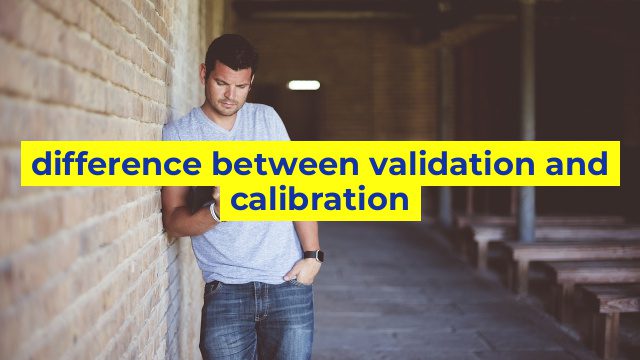The Difference Between Validation and Calibration
When it comes to ensuring that equipment, processes, and systems are accurate and functioning correctly, terms like validation and calibration may be used interchangeably. However, these terms are not synonyms, and understanding the difference between them is essential for effective quality management. In this article, we will explore the key differences between validation and calibration and how both processes are critical to achieving accurate and reliable results.
What is Calibration?
Calibration is the process of adjusting and comparing a device or instrument against a known standard or measurement to determine the accuracy of the equipment. The calibration process involves analyzing and measuring the output of a device, comparing it to a standard, and making adjustments to ensure the accuracy of the device. For example, calibration may be used to ensure that a thermometer is giving an accurate temperature reading. Calibration is a periodic process that ensures the device is operating within its specified accuracy range.
What is Validation?
Validation is the process of verifying that a system, process, or method is operating according to its intended requirements or specifications. The validation process involves gathering data, performing tests or experiments, and analyzing the results to ensure that the system is functioning correctly. Validation is used to ensure that the results of a process or system are reliable, accurate, and consistent. For example, validation may be used to ensure that a manufacturing process is producing products that meet the specific requirements and quality standards.
The Differences Between Calibration and Validation
The key difference between calibration and validation is the focus of the process. Calibration focuses on ensuring that a device or instrument is operating within its specified accuracy range, while validation focuses on verifying that a system or process is consistently providing accurate and reliable results. Calibration is a subset of validation, and both processes are critical to achieving accurate and reliable results.
While calibration is typically a periodic process, validation may be ongoing, particularly in critical systems or processes. Calibration may be conducted in-house, while validation may require external expertise or specialized equipment. Both processes require documented procedures, often involving specific standards, regulations, or guidelines.
Conclusion:
In conclusion, calibration and validation are essential processes that ensure accurate and reliable results in equipment, processes, and systems. Calibration focuses on ensuring the accuracy of a device, while validation verifies that a system or process is consistently providing accurate and reliable results. Understanding the difference between these processes is critical to ensuring effective quality management and meeting regulatory requirements.
Table difference between validation and calibration
| Validation | Calibration |
|---|---|
| Validation is the process of verifying that the output of a system or process meets the desired requirements. | Calibration is the process of adjusting or verifying the accuracy of a measuring instrument or device. |
| Validation is used to determine whether a system or process is working correctly and producing accurate results. | Calibration is used to ensure that measuring devices are accurate and producing consistent results. |
| Validation is performed on processes or systems. | Calibration is performed on measuring instruments or devices. |
| Validation focuses on the output or result of a process or system. | Calibration focuses on the accuracy and reliability of a measuring instrument or device. |
| Validation is necessary to ensure that a process or system meets the desired requirements and produces accurate results. | Calibration is necessary to ensure that measuring instruments or devices are accurate and reliable, which is important for maintaining quality and consistency. |


